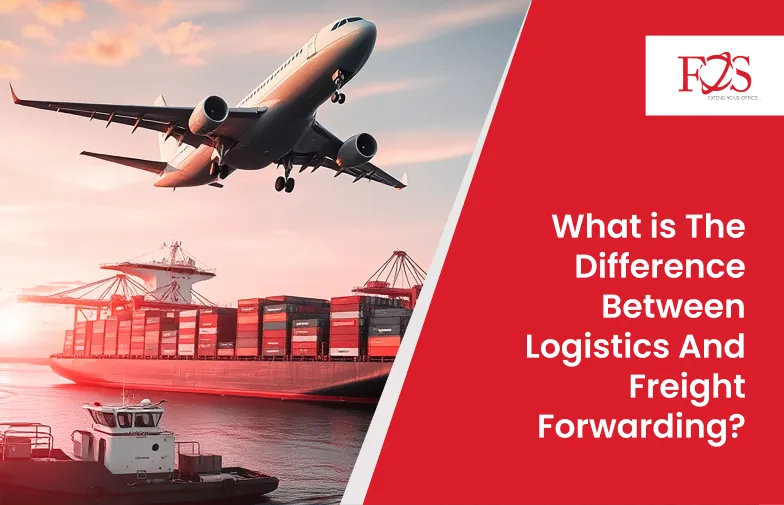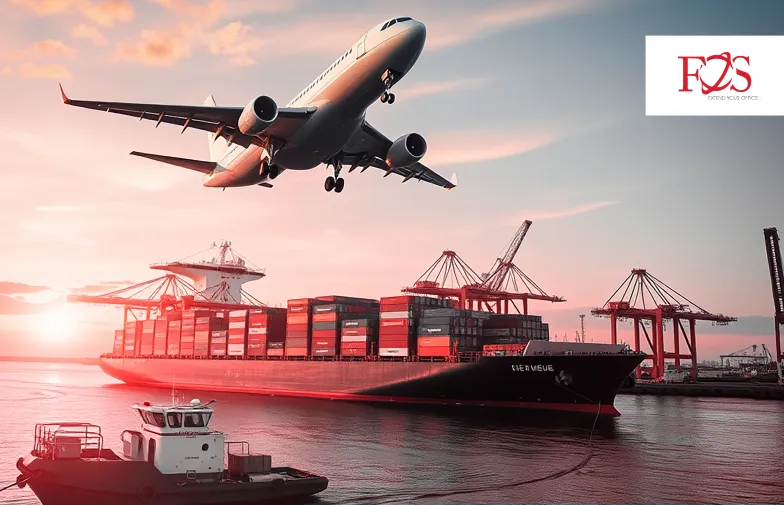Logistics and freight forwarding can be complicated in international trade and supply chain management, so we could find some differences between them. Although they appear to be identical in nature, they each serve a distinct purpose.
In this blog, we will explore the distinctions between logistics and freight forwarding, their respective roles, and the key features they provide in managing the movement of goods.
Logistics
Logistics is nothing but a whole supply chain process that includes the preparation, carrying out, and management of products and related information associated with trade from the point of start to the end of the process. It includes a huge number of works like, the purchase, the transportation, the warehouse management, the stock storage, the stuffing and the distribution.
Generally speaking, logistics management is dedicated to doing the duties by providing a seamless flow of products and information, as well as a high level of customer satisfaction at all times and reducing the amount of waste as little as possible
Freight Forwarding
Freight forwarding, by contrast, is a bunch of logistics activities that are primarily dedicated to the whole process of freight arrangement from one point to another location. The freight forwarders act as the link in the supply chain between the shippers and carriers, resolving different shipping issues such as booking of space for cargo, negotiation of the rates, preparation of the documents as well as tracking of the shipments. Hence, their main objective is sea cargo movement optimization with an increased number of interdependent international trade orders and requirements coordination.
The Major Distinctions in Logistics and Freight Forwarding
| S.No | Logistics | Freight forwarding |
| 1 | Logistics oversees the entire journey of a product, from sourcing and production to delivery, managing warehouses, inventory, and information flow. | Freight forwarders specialize in transporting goods from origin to destination, ensuring timely delivery by coordinating transportation via trucks, planes, or ships. |
| 2 | The logistics industry offers diverse services including warehousing, packaging, ingredient ordering, labeling, quality control, and comprehensive supply chain management solutions, including transportation. | Freight forwarders offer comprehensive services such as carrier selection, route optimization, customs procedures handling, documentation preparation (e.g., bills of lading), and even short-term storage options during shipment. |
| 3 | Logistics service providers may own transportation assets or partner with carriers to optimize resources for secure goods transport. | Freight forwarders typically don’t have their own vehicle resources and rely on carrier networks to ensure timely product delivery. |
| 4 | The major element of logistics aims to optimize the entire supply chain, ensuring timely, accurate, and cost-effective operations. | The core of freight forwarding is efficient and timely transportation of goods from designated locations, ensuring cargo is transported promptly and effectively. |
| 5 | Companies with complex supply chains or high-volume shipments benefit most from utilizing logistics service providers, requiring smart solutions to handle the complex routes of their merchandise. | Businesses needing international or domestic transportation, especially for perishable goods or oversized cargo, greatly benefit from freight forwarding expertise. |
Common Features of Logistics and Freight Forwarding
Despite their differences, logistics, and freight forwarding share some commonalities:
If you want to ensure that goods arrive at the place they are supposed to, you must have an uninterrupted supply chain and shipping fleet; otherwise, it will be tough.
Sometimes, shipments that take place at the same time, even if they are one-time events, provide for efficient operation.
Running two parallel supply chains, consumer-oriented and replenishment-oriented, works best when both types of supply chain management, encompassing all regions, operations, and workers, are used.
No matter how important logistics and freight forwarding are as supply chain management indicators, they work together to bring commodities from suppliers and distribute them to customers. Whereas transportation logistics monitoring is contained inside freight forwarding, logistics takes a broad perspective and moves the focus to the supply chain from an operational standpoint. To summarize, they help to ensure that critical supply chain operations are completed smoothly, which helps businesses achieve their long-term goals of quick customer response and the capacity to compete in the global market.

Conclusion
In summary, this differentiation between logistics and freight forwarding is an important consideration for businesses dealing with international trade and supply chain management. They are interconnected, freight forwarding is part of logistics, including procurement, transportation, and distribution. However, its main function is to undertake the physical movement of goods from one location to another, and perhaps even across borders. Gaining insight into these distinctions allows businesses to run smoothly and tackling the complexities of the international economic sphere is made less burdensome.
These two may differ but their objectives are similar and they have similar attributes too. Both contribute vitally to the frictionless conveyance of goods, which, in turn, is an essential factor in successful customer service and business. Working together, they enable the smooth running of supply chains and help businesses respond fast to customers’ needs to keep their competitiveness.
Are you a freight forwarder? Looking for a reliable partner to outsource your logistical document needs?
We, the FOS Desk, as logistics BPO service partner, will be able to guide and assist the freight forwarders with every document-related duty. The only thing needed right now is to trust us and explore our fruit of labor in the field of logistics and freight forwarding.
